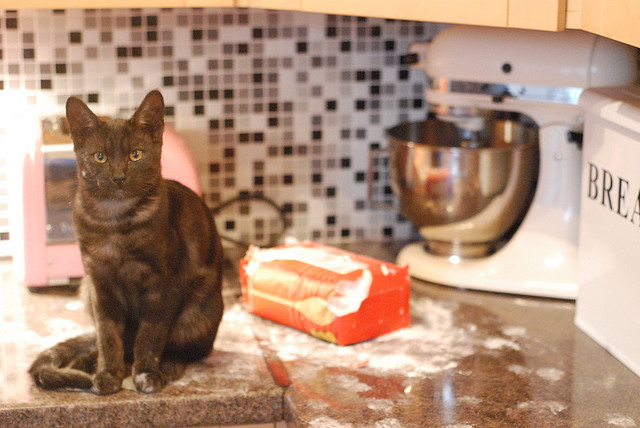
Several food items that are good for people can actually be very toxic — or even deadly — in pets.
Please help us spread the word about our top 10 foods that can harm your pet.
1. Garlic and Onions
Onions and garlic can cause anemia (low red blood cells) in dogs and cats. Cooking these foods does not decrease their toxic effect. A 10-pound dog could become sick by eating only half a small onion. Signs of toxicity include pale gums, drooling and diarrhea, which can develop one to five days after ingestion.
2. Xylitol
Xylitol is an artificial sweetener that is found in gum, candy, mints, mouthwash and toothpaste. It is toxic, sometimes within 30 minutes of ingestion, by causing low blood sugar (hypoglycemia). Signs include vomiting, lethargy and incoordination. In severe cases, xylitol can cause fatal liver failure in dogs.
3. Grapes and Raisins
Both grapes and raisins can cause acute kidney failure (or kidney shutdown) in dogs and cats. Vomiting, diarrhea and lethargy can start within 24 hours of ingestion.
4. Chocolate
Chocolate is toxic to dogs. Dark or baking chocolate is more toxic than milk chocolate. The smaller the dog, the less chocolate the dog would need to ingest, but no amount should be considered safe in any size dog. Be aware that parts of the plant can also be found in cocoa beans and cocoa mulch.
Chocolate can cause vomiting, diarrhea, increased heart rate, shaking, seizures and possibly death, all of which occur within 24 hours of ingestion.
5. Caffeine
Caffeine is found in coffee, coffee grounds, sodas and tea. It is rapidly absorbed after ingestion. Symptoms are the same as with chocolate, but cats are even more sensitive than dogs.
6. Bread Dough
Fermentation of certain yeasts can cause the production of ethanol or alcohol. This is commonly found in unbaked bread dough, grain alcohol and rotting apples. Ethanol is absorbed into the blood stream and can cause breathing difficulties, cardiac arrest and even death in severe cases. Sometimes the gases from the fermentation can cause bloat, a major emergency in dogs.

7. Macadamia Nuts
These are found in nut mixes and pastries (which also could contain chocolate). Signs in dogs include joint pain, vomiting, weakness, depression and pale gums. It can take up to 12 hours for signs to appear after ingestion.
8. Bones
Some pet owners are adamant about the safety of giving bones to dogs. They swear it’s good for them and their teeth, and their balance, and their well-being. Unfortunately, as a surgeon, I see things differently. I have removed bones of all sizes, origins and shapes from virtually every part of the GI system. This includes the esophagus (the tube between your mouth and your stomach), the stomach and the intestines.
9. Fatty Food
Family and emergency vets see an increase in pancreatitis (irritation of the pancreas) around holidays. This is mainly because owners feed their pets fatty foods — such as turkey on Thanksgiving. This can cause pancreatitis, which is painful and typically requires hospitalization and emergency treatment.
10. Trash
It’s important to secure your trash, whether it is inside or outside. It is challenging for a dog to resist a yummy, smelly trash can. Depending on what’s in your trash can, it can lead to other problems related to non-food items, which can also get stuck in a dog’s GI tract.
If you think your pet ingested any of these food items, call your vet immediately. Depending on the toxin, you may (or may not) be instructed to induce vomiting at home (so please don’t do that without specific instructions). Treatment varies greatly depending on the food involved.
As always, prevention is the best approach, so pet-proof your kitchen, your pantry and your trash to avoid getting into a sticky — and costly — situation.


